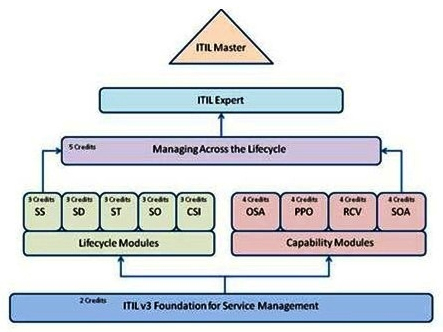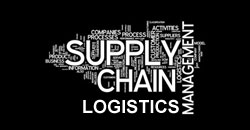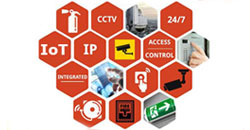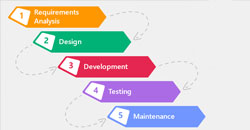ITIL describes processes, procedures, tasks, and checklists which are not organization-specific, but can be applied by an organization for establishing integration with the organization's strategy, delivering value, and maintaining a minimum level of competency. It allows the organization to establish a baseline from which it can plan, implement, and measure. It is used to demonstrate compliance and to measure improvement.
The ITIL Qualifications scheme provides a modular approach to the ITIL framework, and is comprised of a series of qualifications focused on different aspects of ITIL Best Practice, to various degrees of depth and detail.
These are the levels of qualifications within the scheme:
- ITIL Foundation
- ITIL Intermediate Level
- ITIL Managing Across the Lifecycle
- ITIL Expert Level
- ITIL Master Qualification

(AXELOS Limited 2011 owns the copyright for the above material)
ITIL v3 Foundation
ITIL Foundation is the most recognized skill and certification for IT professionals and employees wishing to excel in IT Service Management. The purpose of the ITIL® 2011 Foundation certificate in IT Service Management is to certify that the candidate has gained knowledge of the ITIL® terminology, structure and fundamental concepts and has understood the core principles of ITIL® practices for Service Management.
ITIL v3 2007 (updated in 2011) has the following five volumes:
- Service strategy
- Service design
- Service transition
- Service operation
- Continual service improvement (CSI)
Course Contents
Candidates can expect to gain knowledge and understanding in the following topics:
- Introduction to ITIL
- Overview of ITIL & Basic Concepts
- Service Management as a practice
- Service Lifecycle
- Key Principles
- ITIL Model
- ITIL Processes
- ITIL Roles
- ITIL Functions
- Awareness of ITIL qualification scheme
Examination
- 1-hour duration
- 40 Multiple Choice Questions
- Passing Marks @ 26 correct answers out of 40 questions (65%)
- Closed book exam
- No electronic devices permitted
- Introduction to ITIL Lifecycle modules (Service Strategy, Service Design, Service Transition, Service Operation, Continual Service Improvement)
- Conducting Strategic Assessments
- Financial Management
- Service Portfolio Management
- Service Design Processes
- Service Catalog Management (SCM)
- Service Level Management (SLM)
- Change Management
- Service Asset and Configuration Management
- Common Service Operation Activities
- Monitoring and control of IT operation
- Service Operation structure
- Key functions of the Service Desk
- Principles of Continual Service Improvement
- Implementing Continual Service Improvement
- Implementation challenges and risks
- Operational Support & Analysis
- Planning, Protection & Optimization
- Release, Control & Validation
- Service Offerings & Agreements
- 90 -minues duration
- Multiple choice, scenario-based, gradient scored questions
- Passing Marks @ 28 correct answers out of 40 questions (70%)
- Closed book exam
- No electronic devices permitted
ITIL Intermediate - Service Life Cycle / Service Capability
The intermediate level of ITIL offers a role based hands-on experience and in-depth coverage of the contents. In this course, you learn how to plan, implement and optimize the Operational Support and Analysis processes and gain the skills required to take the ITIL Intermediate Qualification. Service Life Cycle
This stream approaches ITIL from the management perspective of an organization. These modules focus on executing and implementing a complete stage of the Service Lifecycle.
In general, the modules in this stream may be more suited to those with managerial responsibility looking at the overall IT Service Management picture.
Service Capability
The Capability modules focus on the technical and hands-on approach. They are more process oriented and provide a deep understanding of the ITIL processes and functions, how they are applied and how they act together.
In general, the modules in this stream are most useful to those who take part, or want to take part, in the day-to-day practical activities described within each of the processes.
Course Contents
Examination

























